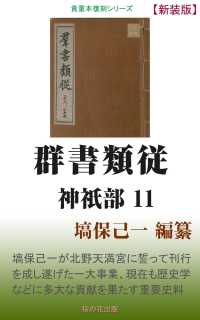- ホーム
- > 洋書
- > 英文書
- > Politics / International Relations
Full Description
This novel and original book examines and disaggregates, theoretically and empirically, operations of power in international security regimes. These regimes, varying in degree from regulatory to prohibitory, are understood as sets of normative discourses, political structures and dependencies (anarchies, hierarchies, and heterarchies), and agencies through which power operates within a given security issue area with a regulatory effect.
In International Relations, regime analysis has been dominated by several generations of regime theory/theorization. As this book makes clear, not only has the IR Regime Theory been of limited utility for security domain due to its heavy focus on economic and environmental regimes, but it, too, heuristically suffered from its rigid pegging to general IR Theory. It is not surprising then that the evolution of IR Regime Theory has largely been mirroring the evolution of IR Theory in general: from the neo-realist/neo-liberal institutionalist convergence regime theory; through cognitivism; to constructivist regime theory.
The commitment of this book is to remedy this situation by bringing together robust power analysis and international security regimes. It provides the reader with a theoretically and empirically uncompromising and comprehensive analysis of the selected international security regimes, which goes beyond one or another school of IR Regime Theory. In doing so, it completely abandons existing, and piecemeal, analysis of regimes within the intellectual field of IR based on conventional grand/mid-range theorization.
Contents
Introduction
Chapter 1. Theorizing International Security Regimes: From Three Waves of 'Isms' to the Power-Analytical Approach
Chapter 2. The 19th Century Security Regime Complex
Chapter 3. From Landmines to Cluster Munitions: Resurfacing and Spill-Over of Transhistorical Humanitarian Disarmament
Chapter 4. Small Arms and Light Weapons: From Humanitarian Disarmament to Arms Trade Treaty
Chapter 5. Humanitarianism Meets Nuclear Arms Control
Chapter 6. On the Verge of Change? 'Killer Robots' and Security Regulation
Conclusion
-

- 和書
- 播磨を旅するワークブック
-

- 電子書籍
- 群書類従 神祇部11






